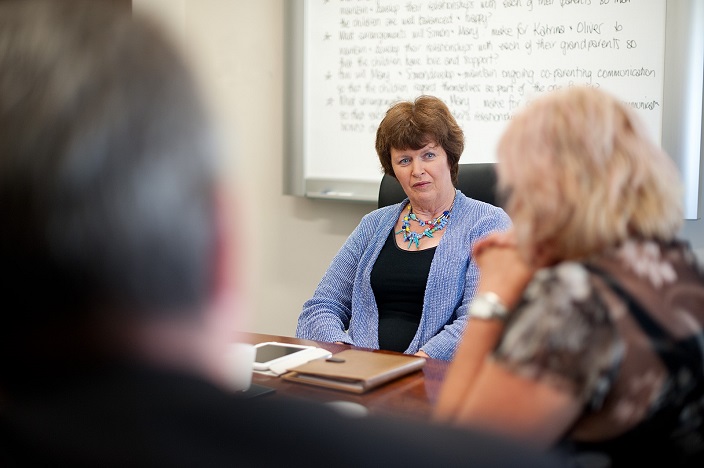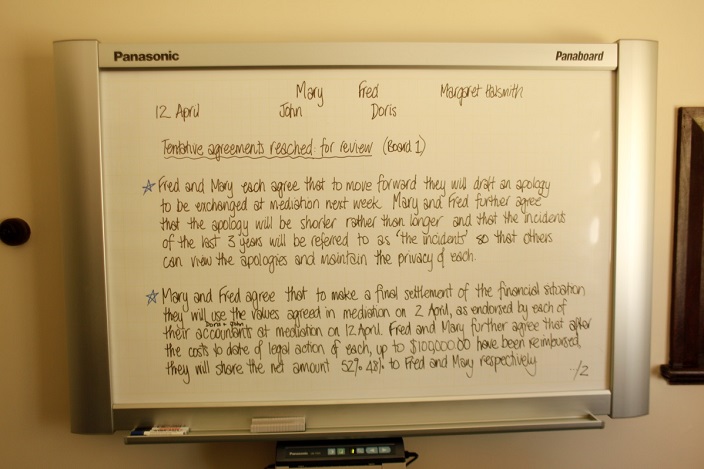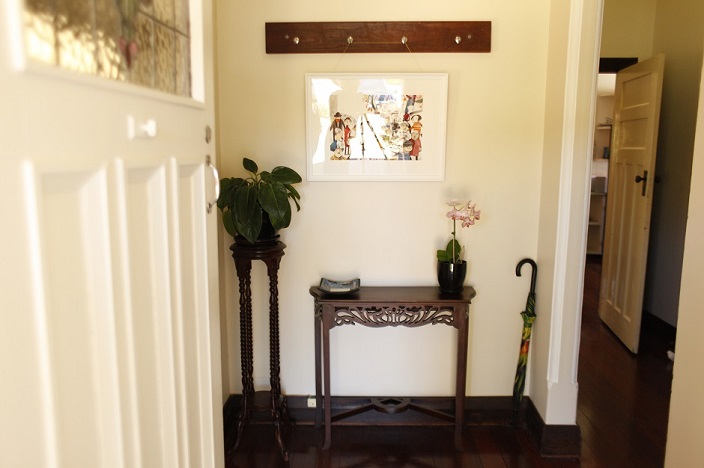
Finding your way around Mediation
This page is designed to assist you to consider whether mediation may be suitable in your current or future circumstances. I welcome your email or phone call to discuss your specific questions and any concerns.
This page and our Mediation FAQs provide a comprehensive overview of mediation. You can find a detailed explanation of mediation in the Mediation Handbook.
|
|
This website contains general information. If you would like personalised information specific to mediation please contact me.
|
|

Margaret Halsmith
 My role is to provide best practice mediation. That way you and the other people involved can participate in a series of productive future-focused conversations.
My role is to provide best practice mediation. That way you and the other people involved can participate in a series of productive future-focused conversations.
My experience has shown me that the structured process of mediation works. With my assistance you are more able to listen generously, think constructively, speak moderately, decide wisely and then to conclude your mediation satisfactorily, putting your best foot forward.
My approach is to facilitate with evenhandedness throughout your mediation: to listen respectfully to what is said; to think compassionately about what I hear; to speak practically and optimistically as I assist you to reach agreement and then to conclude sincerely.
My aim is to provide the optimum conditions for you and each other person involved to participate in a fair process. That way you will be able to look back with confidence on your mediation and on the outcome you have reached.
In almost 20 years of mediating agreements with people in dispute, a number of participants have told me that their mediation has included some moments that were particularly significant for them. Sometimes this happens when one person spontaneously compliments another. Sometimes it happens when one person discovers that the other does know what is important to them. Sometimes it is when consideration shines through as agreements are reached. It is these glimpses of ‘grace under pressure’ that fosters my optimism about people’s capacity to make their own decisions.
Back to top
Back to Finding your way around

Selecting mediation
People select mediation when they want all involved to have their fair say, in a fair way.
|
|
Mediation success rates
The Productivity Commission’s Access to Justice Arrangements Report of December 2014 gives examples including
“Legal Aid NSW Family Dispute Resolution achieved a full or partial settlement rate of 81 per cent in 2012-13.
Annual reports of the Office of the Victorian Small Business Commissioner indicate that around 70 to 80 per cent of matters resolve at mediation.”
Elsewhere it is indicated that
“In wills (disputes), mediation has a claimed success rate of between 85% and 90%.”
|
|
Mediation is successful because
-
it is a fair and a dignified way to discuss your issues and to make wise decisions.
-
it is people-focused rather than legally-assisted; focussing on yours and others’ concerns.
-
the decisions are made by the experts: by you and the other people involved.
|
|
Mediation
You have choices when you decide to resolve conflict. You can focus on your rights and apply the rules while others focus on their rights and apply their rules; you can use your authority for making decisions and compete with other people who are using their decision making authority; or you can ask people about their concerns, listen for what is important to them, then explain your concerns and what is important to you.
Each person has very similar rights, so rights tend to clash. Each person has a unique perception of how power is appropriately used, so power leads to struggle. Each person has concerns. Concerns tend to come together and can usually be resolved by a mutually satisfactory outcome.
The mediation process melds concerns to create mutually satisfactory outcomes.
|
|
You can find examples of some of the mediations I have conducted in a range of circumstances on the Case Studies page.
Back to top
Back to Finding your way around

Benefits of mediation
People who have mediated with me explain what they appreciate about mediation:
Makes good use of time and money
-
saved costs because we used our time efficiently and most costs were shared
-
was timely because it was all sorted out within a few weeks of starting
Puts the situation in perspective
-
helped us to see the whole dispute because all the issues became clear
-
helped me to speak openly about all my concerns because mediation is confidential
Results in outcomes that will last because agreements are made about all the real issues
-
was respectful because each person’s point of view contributed to our agreements
-
gave us a way to avoid future conflicts because our agreements include guidelines
|
|
The Supreme Court of Western Australia lists the following benefits of mediation:
-
because the parties find their own solutions to their dispute, they are likely to be satisfied with the outcome.
-
mediation is faster and less expensive than a trial.
-
there is more flexibility: parties often reach solutions that would not be possible at trial.
|
|
Back to top
Back to Finding your way around

Selecting your Mediator
When you and the other people involved have decided that you will consider mediation, your next step is to select your mediator. The Mediator Standards Board explains why it is important to choose an accredited Mediator.
It is wise to choose a Mediator who you can each get along with because rapport between everyone in the room significantly influences the tone, the flow and the outcome of your mediation.
It is important that the Mediator is acceptable to you and the other participant/s. There are a number of starting points for making your selection. It can be a positive first step if you can select your Mediator cooperatively. Some people, however, decide individually to meet with the Mediator before mentioning it to the other person/people involved. Others obtain general agreement to mediate then one person selects the Mediator. Others decide on their Mediator together. Cooperation is the key, whether before, during or after you make your selection.
The outcome of your mediation is likely to be a set of very significant decisions with long-lasting implications. It is wise to choose a Mediator who has experience, professionalism and people skills and who will focus on the process while guiding you to focus on your outcomes.
You may like to read my post in my Mediation Musings blog on the topic of Selecting your Mediator.
Back to top
Back to Finding your way around

Mediating with Margaret Halsmith
Each Mediator brings their style to their mediation practice. You will find information below about my style: my philosophy, my experience, my professional and practical style. It may assist you to decide whether mediation with me is for you. I welcome your phone call or email to discuss your specific questions and any concerns.
 Margaret alternating between participants in joint session; lawyer observing. Image Credit: Dale Neill
Margaret alternating between participants in joint session; lawyer observing. Image Credit: Dale Neill
My philosophy
I regard you and all people as
-
experts in your own lives
-
proactive and forward thinking
-
decision makers in their best interests
My mediation practice has a number of building blocks: specifically aiming for best practice mediation; and generally aiming for peaceful resolution of conflict; dispute resolution education and training and dedication to various public roles.
My experience
I have been a Mediator since 1996. I have mediated agreements for people from all walks of life over a broad range of issues in various settings across the spectrum: in interpersonal and relationship settings, business and commercial settings, family and extended family settings, community settings and government settings. For more details see About.
My professional style
When mediating, I strive to be highly professional at all times. Each person in each mediation has my full attention throughout each mediation session.
Part of my professionalism involves maintaining and extending my knowledge and skills through CPD (Continuing Professional Development). I focus on practice-with-integrity. My goal is to provide best practice mediation at all times. My values align with the Resolution Institute Code of Ethics and the International Mediation Institute Code of Professional Conduct.
My personal style
I am a people person. I find that I connect with most people most of the time including in very difficult and stressful circumstances. I aim to mediate professionally and authentically by being genuine, supportive and flexible.
My practical approach
My approach reflects my mindset that you and each other participant are each unique and equal. I think of you each as being right, uniquely right, and as having decided to reach a practical solution that takes account of what is important to each of you. In your mediation you each have a specific role designed to complement each other role, designed to add value for all.
My approach is to assist you, and the other participants, the personal support people and the professional advisors, if present, to contribute to maintaining the tone of equality and cooperation throughout your mediation.
After your individual initial separate sessions I book three mediation sessions which may or may not all be needed. In the intervals between mediation sessions, I respond promptly to emails and phone calls. I check that I am answering your questions clearly. I take care to maintain my evenhandedness at all times and I ask for your feedback throughout your mediation.
My approach to your mediation is to manage the process so that you and the other participants can listen generously, think productively, speak moderately, decide wisely and conclude satisfactorily. At the start I provide an overview of the process and as you progress through your mediation I explain each stage in more detail. It is my responsibility to manage the process; it is your responsibility to raise the issues for discussion and to participate in a guided discussion toward a resolution for each issue.
.aspx)
It is also my responsibility to check regularly with you regarding whether you think you are making progress toward satisfactory practical and durable outcomes. It is your responsibility to give me feedback on your assessment of the progress toward outcomes for you and the other person/people involved.
.aspx)
My accreditations
-
Accredited Mediator NMAS [National Mediator Accreditation System; Australia]
-
Accredited Mediator Advanced LEADR [Association of Dispute Resolvers; Australasia]
-
Accredited and registered FDR Practitioner [Attorney General’s Department; Australia]
-
Accredited Mediator IMI [International Mediation Institute; The Hague, Netherlands]
-
Appointed Mediator under Aged Care Act 1997 (Cth) and Principles 1998 -2008
More information
You can read my Testimonials here and read more about me and my practice here. You can read examples of some of the mediations I have conducted in a range of circumstances on the Case Studies page.
This page with the Mediation FAQs provides an overview of mediation. You can find a detailed explanation of mediation in the Mediation Handbook.
You can find more short descriptions of Mediation on my Twitter feed 
I welcome your email or phone call.
Back to top
Back to Finding your way around

Your outcomes
Mediation provides you and the other participants with the opportunity to achieve practical outcomes including written agreements and personal outcomes including how to manage any further conflicts.
Most participants in most mediations reach agreement. It is generally accepted that approximately 80 per cent of people who participate in mediation reach a full agreement.
A typical agreement has 10 to 20 statements. Below are some examples of the statements that participants have included in their agreements. The names are fictitious. The agreements are real.
Agreements that you and the other participants reach can be agreements that finalise issues or agreements that set up guidelines for ongoing issues.
Practical outcomes: Agreements that finalise issues
This is an example of two statements from a page of agreed statements from a commercial mediation
-
Rob and Lee agree that each will retain one of the two warehouses.
-
Lee and Rob agree that from DD.MM.YY Lee will take sole responsibility for the warehouse at (address) and Rob will take sole responsibility for the warehouse at (address)

Practical outcomes: Agreements that set up guidelines for ongoing issues
This is an example of two statements from a page of agreed statements from a workplace mediation
-
Kim and Ren and Alex and Zia agree that each will attend a start-of-week meeting.
-
Zia and Alex and Ren and Kim agree that the facilitator of each meeting will rotate among them, according to the schedule created in mediation and that the locations of meetings will be the office of the facilitator.
Personal outcomes
-
certainty
-
acknowledgement
-
closure
-
confidence
|
|
-
motivation
-
satisfaction
-
acceptance
-
self-respect
|
|
|
Participating in Mediation
Mediation is participation in a structured process of weaving decisions directly from your own ideas and indirectly from other participants’ ideas.
Mediation is participation in a structured process in which you maintain loyalty to your own values while developing joint ideas that you can be loyal to
|
|
Back to top
Back to Finding your way around

FAQs
People who are considering mediation often tell me that they find that there is a lot to learn. The Mediation FAQs answer the questions I am most frequently asked. They start by explaining how mediation works, what it costs, your rights and responsibilities in mediation and the rights and responsibilities of the other participants.
Back to top
Back to Finding your way around

Image Credit: Robert Woods